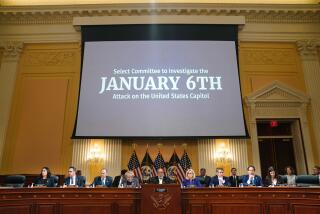New Blow to Pretoria
- Share via
The failure of President Reagan’s policy of “constructive engagement” with South Africa had been evident long before it was confirmed Tuesday by a blue-ribbon advisory committee. But the new report may at least serve to push U.S. policy in a new and more effective direction.
Committee members advocated action to:
--Win the support of allies in imposing additional economic sanctions.
--Establish closer ties and give additional support to the black majority and the organizations, including the outlawed African National Congress, that represent the blacks.
The report has a particular significance because of the stature of the 12 members of the committee--for the most part distinguished leaders in business, labor and government. When they were appointed in 1985, there was every expectation in the Reagan Administration that they would support the friendly persuasion then being applied to Pretoria. But the result was a very different one. Nine of the 12 advocated an international campaign to enlist America’s allies in broader economic sanctions against South Africa, and two of that majority of nine were disappointed that even more vigorous actions were not proposed.
Secretary of State George P. Shultz rejected the proposal for additional sanctions--which is hardly surprising, given the strong resistance of the Administration. As a minority of three on the committee noted, there is little evidence to suggest that sanctions are effective. But that ignores why Congress overrode a presidential veto and imposed them in the first place. The ineffectiveness of the Reagan policy was manifest. Worse, evidence was growing that white South Africans misinterpreted “constructive engagement” as license to do largely as they pleased, peeling away the irritations of petty apartheid but perpetuating the fundamental racism of a system in which the majority has no voice in the national government. Faced with that intractable stand, Congress turned to sanctions. The sanctions have at least served to communicate to South Africa the high cost of perpetuating racism.
The committee’s support for expanded contacts with and support for the black majority in South Africa, including the African National Congress,is useful. Some of these contacts were mandated by the sanctions legislation voted by Congress last year, but clearly the committee recognizes that much, much more can and should be done to establish ties with those who inevitably will rule South Africa. To his credit, Shultz has opened a direct dialogue with the ANC. This report gives encouragement to making that dialogue a continuing element of U.S. policy.
The committee also cautioned that the President’s clandestine arms shipments to the UNITA forces of Jonas Savimbi, seeking to overthrow the government of nearby Angola, can only undermine American credibility in dealing with all the blacks of Southern Africa. Congress should waste no time in putting an end to that wasteful program while providing additional aid for the blacks in Southern Africa.
More to Read
Get the L.A. Times Politics newsletter
Deeply reported insights into legislation, politics and policy from Sacramento, Washington and beyond. In your inbox twice per week.
You may occasionally receive promotional content from the Los Angeles Times.








